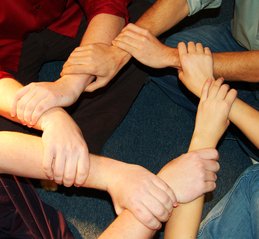 A sense of reduced personal efficacy is a key component of burnout (Maslach and Leiter, 2006). When we are feeling burned out, we feel less able to influence decisions affecting our work, and to shape the work environment into one consistent with our personal values (Letier and Maslach, 2006). This sense of inefficacy or disempowerment can make our burnout worse. Conversely, more engagement or job satisfaction is reported when we feel that we are able to participate in decision-making in our organization and have the power and control to effectively do their job in a manner congruent with our personal values. Another element affecting the sense of efficacy is social support and teamwork. Based on this research the Empowerment component of the CARE offers training and resources about the importance of this sense of efficacy, and strategies for improving it. Although a lot of these strategies concern external workplace dynamics, the CARE trainings foster an intra-personal sense of empowerment. Studies in positive psychology such as Fredrickson’s ‘Broaden and Build theory’ suggest that cultivation of positive emotions broaden our thought-action repertoire and thus our personal resources, making us more creative and open as well as happier. The more options one has at one’s disposal, the greater one’s sense of efficacy and empowerment.
A sense of reduced personal efficacy is a key component of burnout (Maslach and Leiter, 2006). When we are feeling burned out, we feel less able to influence decisions affecting our work, and to shape the work environment into one consistent with our personal values (Letier and Maslach, 2006). This sense of inefficacy or disempowerment can make our burnout worse. Conversely, more engagement or job satisfaction is reported when we feel that we are able to participate in decision-making in our organization and have the power and control to effectively do their job in a manner congruent with our personal values. Another element affecting the sense of efficacy is social support and teamwork. Based on this research the Empowerment component of the CARE offers training and resources about the importance of this sense of efficacy, and strategies for improving it. Although a lot of these strategies concern external workplace dynamics, the CARE trainings foster an intra-personal sense of empowerment. Studies in positive psychology such as Fredrickson’s ‘Broaden and Build theory’ suggest that cultivation of positive emotions broaden our thought-action repertoire and thus our personal resources, making us more creative and open as well as happier. The more options one has at one’s disposal, the greater one’s sense of efficacy and empowerment.